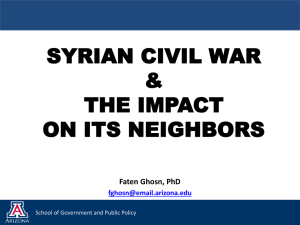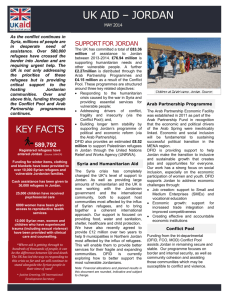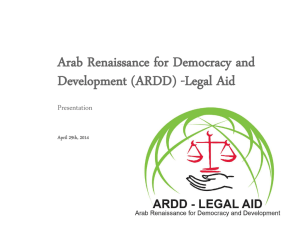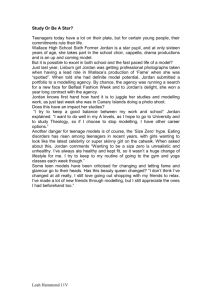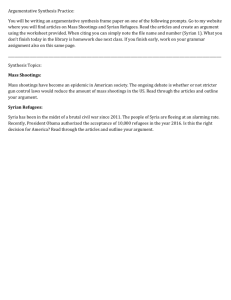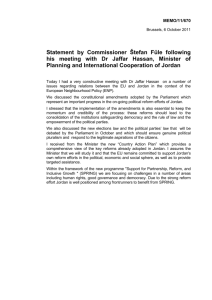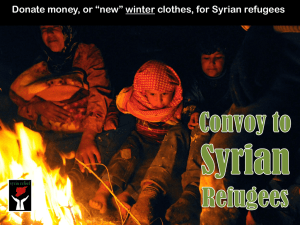URGENT ACTION - Amnesty International USA
advertisement
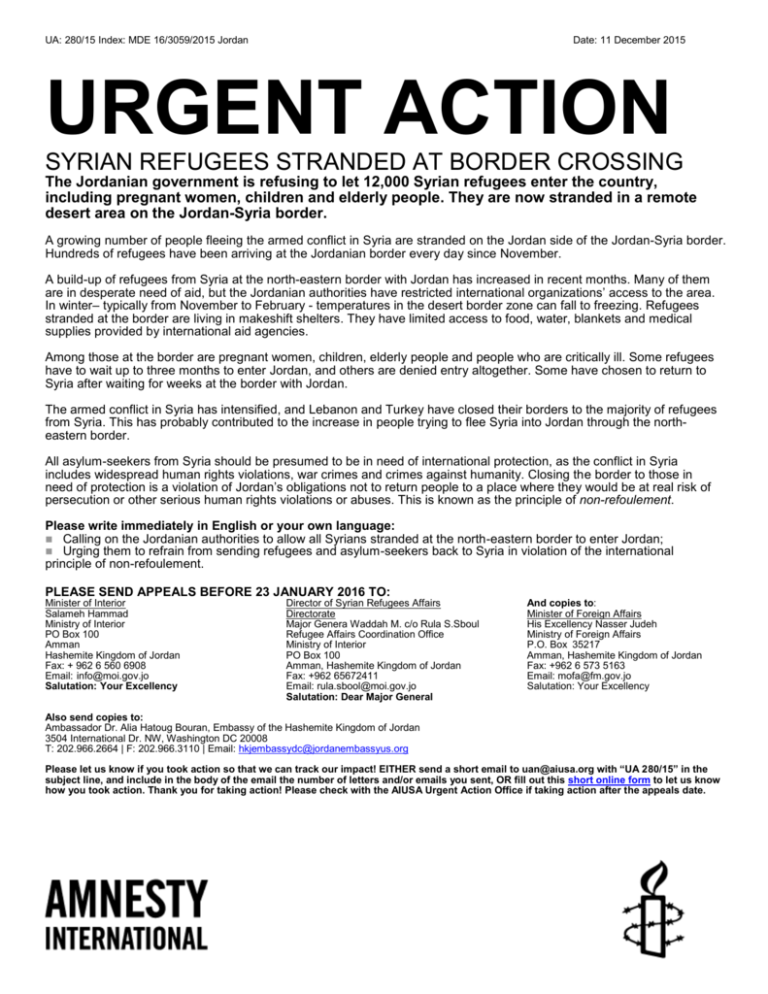
UA: 280/15 Index: MDE 16/3059/2015 Jordan Date: 11 December 2015 URGENT ACTION SYRIAN REFUGEES STRANDED AT BORDER CROSSING The Jordanian government is refusing to let 12,000 Syrian refugees enter the country, including pregnant women, children and elderly people. They are now stranded in a remote desert area on the Jordan-Syria border. A growing number of people fleeing the armed conflict in Syria are stranded on the Jordan side of the Jordan-Syria border. Hundreds of refugees have been arriving at the Jordanian border every day since November. A build-up of refugees from Syria at the north-eastern border with Jordan has increased in recent months. Many of them are in desperate need of aid, but the Jordanian authorities have restricted international organizations’ access to the area. In winter– typically from November to February - temperatures in the desert border zone can fall to freezing. Refugees stranded at the border are living in makeshift shelters. They have limited access to food, water, blankets and medical supplies provided by international aid agencies. Among those at the border are pregnant women, children, elderly people and people who are critically ill. Some refugees have to wait up to three months to enter Jordan, and others are denied entry altogether. Some have chosen to return to Syria after waiting for weeks at the border with Jordan. The armed conflict in Syria has intensified, and Lebanon and Turkey have closed their borders to the majority of refugees from Syria. This has probably contributed to the increase in people trying to flee Syria into Jordan through the northeastern border. All asylum-seekers from Syria should be presumed to be in need of international protection, as the conflict in Syria includes widespread human rights violations, war crimes and crimes against humanity. Closing the border to those in need of protection is a violation of Jordan’s obligations not to return people to a place where they would be at real risk of persecution or other serious human rights violations or abuses. This is known as the principle of non-refoulement. Please write immediately in English or your own language: Calling on the Jordanian authorities to allow all Syrians stranded at the north-eastern border to enter Jordan; Urging them to refrain from sending refugees and asylum-seekers back to Syria in violation of the international principle of non-refoulement. PLEASE SEND APPEALS BEFORE 23 JANUARY 2016 TO: Minister of Interior Salameh Hammad Ministry of Interior PO Box 100 Amman Hashemite Kingdom of Jordan Fax: + 962 6 560 6908 Email: info@moi.gov.jo Salutation: Your Excellency Director of Syrian Refugees Affairs Directorate Major Genera Waddah M. c/o Rula S.Sboul Refugee Affairs Coordination Office Ministry of Interior PO Box 100 Amman, Hashemite Kingdom of Jordan Fax: +962 65672411 Email: rula.sbool@moi.gov.jo Salutation: Dear Major General And copies to: Minister of Foreign Affairs His Excellency Nasser Judeh Ministry of Foreign Affairs P.O. Box 35217 Amman, Hashemite Kingdom of Jordan Fax: +962 6 573 5163 Email: mofa@fm.gov.jo Salutation: Your Excellency Also send copies to: Ambassador Dr. Alia Hatoug Bouran, Embassy of the Hashemite Kingdom of Jordan 3504 International Dr. NW, Washington DC 20008 T: 202.966.2664 | F: 202.966.3110 | Email: hkjembassydc@jordanembassyus.org Please let us know if you took action so that we can track our impact! EITHER send a short email to uan@aiusa.org with “UA 280/15” in the subject line, and include in the body of the email the number of letters and/or emails you sent, OR fill out this short online form to let us know how you took action. Thank you for taking action! Please check with the AIUSA Urgent Action Office if taking action after the appeals date. URGENT ACTION SYRIAN REFUGEES STRANDED AT BORDER CROSSING ADDITIONAL INFORMATION Jordan hosts over 632,000 refugees from Syria and is one of five main host countries in the region which together host over four million refugees from Syria. Only 52% of Jordan’s UN humanitarian funding requirements for 2015 have been met by the international community. In addition, only 160,664 resettlement places have been offered to Syria’s most vulnerable refugees in the region, which is less than 2% of the total Syrian refugee population there. Jordan has gradually restricted access to Syrians since 2012, and stopped keeping its borders open for Syrians fleeing conflict. The official border crossing between the Jordanian city of Ramtha and Dera’a in Syria was closed in 2012 and entry for certain categories of people, including Palestinians fleeing Syria, unaccompanied men who cannot prove family ties to Jordan, and people without identity documents have been barred since then. In mid-2013 the western and eastern border crossings were also closed to Syrians, with a few exceptions made for the war-wounded and the most vulnerable by Jordan’s own criteria, some of whom are treated and then sent back to Syria, in contravention of Jordan’s customary international obligations. In May 2014 Jordan began stopping Syrians arriving at its international airport from entering unless they had a Jordanian residency permit or met a limited number of special exceptions. In July 2014 Jordan started severely restricting access through its north-eastern crossings, leaving many stranded at the Hadalat and Rukban crossings. Jordan has not provided any official reason for closing its borders. In March 2015, at the Third International Pledging Conference for Syria, which aims to raise humanitarian funding for the UN’s regional response to the Syria crisis, Jordan’s prime minister said that the country’s capacity to respond to Syria’s refugees had been exceeded. Amnesty International recognizes the incredible strain that Jordan and other countries in the region are under and the urgent need for the international community to share more responsibility, but Jordan has a duty to protect refugees from Syria fleeing conflict and persecution and to allow them to enter the country. Jordan has not ratified the 1951 Convention Relating to the Status of Refugees, or its Protocol of 1967. However under international customary law and other instruments, such as the International Convenant on Civil and Political Rights and the Convention against Torture, Jordan is obliged not to return people to a place where they would be at real risk of persecution or other serious human rights violations or abuses. This is known as the principle of non-refoulement and prohibits the rejection of asylum-seekers at the border and the deportation of refugees. Names: Syrian refugees Gender m/f: both UA: 280/15 Index: MDE 16/3059/2015 Issue Date: 11 December 2015 UA Network Office AIUSA | 5 Pennsylvania Plaza, New York NY 10001 T. 212. 807. 8400 | E. uan@aiusa.org | amnestyusa.org/uan
